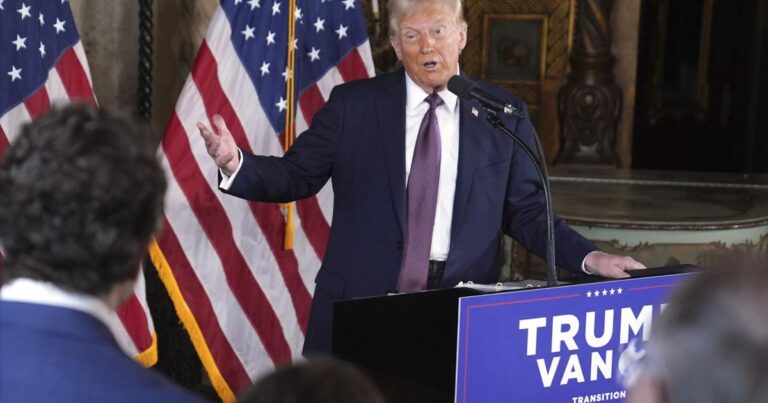WASHINGTON — The Maya called the Gulf of Mexico “Chactemal” because of its reddish hue at sunset.
After Hernán Cortés conquered the land now known as Mexico in 1519, it was Spanish cartographers who began connecting this body of water with the Mexica River, as the Aztecs called themselves.
Initially, the Spanish called the bay “Gulf of Mexico.” By the 1600s, most maps had “Gulf of Mexico” written on them.
Spain controlled nearly all the land adjacent to the 218,000 square mile ocean basin, extending from Cuba, Florida, Alabama, Mississippi, Louisiana, Texas, and Mexico. In 1717, the year before New Orleans was founded, France also called it the “Gulf of Mexico.”
President-elect Donald Trump announced Tuesday that the Gulf of Mexico will be renamed the “Gulf of America.”
“What a beautiful name. It’s fitting,” President Trump said at a press conference.
The Gulf’s name change was announced amid comments on the takeover of Greenland and the Panama Canal, and he did not rule out the possibility of using force, but the policy of making Canada the 51st state is likely to lead to even bigger calls around the world. It attracted attention. But that’s not the case in Louisiana or Mexico.
Mexican President Claudia Sheinbaum scoffed at the idea.
Spain, then Mexico, owned Texas, New Mexico, Arizona, and California for 400 years before ceding the territory to the United States in 1848 after the war.
She pointed to an 1814 document that recommended changing the name of the continent, as North America was commonly called at the time, to “America Mexicana.”
“Isn’t it pretty?” said Sheinbaum.
Some Republican politicians echoed the spirit of Sheinbaum’s comments.
Sen. Bill Cassidy (R-Baton Rouge) supported “Louisiana Bay.”
“We produce energy there. We make a living there,” he said. we fish there. That’s what I should call it. ”
Texas Governor Greg Abbott (R) wrote on social media that he would prefer “Texas Bay.”
“If you want to change the name…this is it,” Abbott wrote of X.
The “American Gulf” concept first surfaced in the Mississippi State Legislature in 2012. Retired state Rep. Steve Holland, an independent from Tupelo, passed a bill that never made it out of committee to rename bodies of water off three counties on the state’s coast, but he passed it on to the state House’s Latino immigration restrictions. He called it a satirical response to the proposed bill. state.
Mr. Trump’s proposal also sparked a deeper partisan conflict.
“Donald Trump is insane,” Senate Minority Leader Chuck Schumer (D-N.Y.) said Wednesday on the Senate floor. “So he’s doing what he always does at times like this, distracting America with crazy ideas. Renaming the Gulf of Mexico might be a crazy new idea. But it won’t help people save money at the grocery store.”
Rep. Troy Carter (D-New Orleans) agreed.
“Louisianas didn’t send me to Washington to change the name of the Gulf of Mexico. I worked to lower the cost of living for working-class families, create good-wage jobs, and make our communities safer. I’m here,” he said.
The name change is now about more than just President Trump’s comments.
MAGA supporter Rep. Marjorie Taylor Greene (R-Ga.) has introduced a House bill that would force the Board of Geographical Names to change names on government documents and maps if Congress agrees. Fourteen House Republicans signed on as co-sponsors.
Under international law, the United States and Mexico each own 12 nautical miles from their coasts, but they can only enforce laws up to 24 nautical miles and exploit natural resources up to 200 nautical miles. Louisiana is approximately 600 nautical miles from Cancun.
A name change in the United States doesn’t necessarily mean the rest of the world will agree, but it starts with the Place Names Commission. The board is comprised of representatives from the State Department, the Central Intelligence Agency, the Library of Congress, and other agencies. The organization operates under the Secretary of the Interior and, if approved, would be headed by North Dakota Governor Doug Burgum.
House Minority Leader Steve Scalise (R-Jefferson) said he had not seen Greene’s bill and could not comment. He was stopped by a Politico reporter at the venue and said everything he wanted to say about the issue. “The Gulf of Mexico is the base of my district, and it’s in the United States. Let’s call it the Gulf of America.”
Others in the Louisiana delegation took their decisions to heart. Newly elected U.S. Rep. Cleo Fields (D-Baton Rouge) had no opinion. House Speaker Mike Johnson (R-Benton) did not respond to a request for comment.
“I’m not sure if this is the case,” said Republican Rep. Julie Letlow, whose district in northeast Louisiana includes parts of Baton Rouge around LSU. I’m glad we’ll soon have a president who is serious about reducing drilling and energy costs. ”


